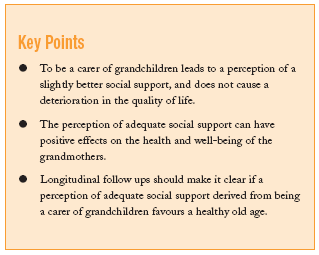In the context of family medicine there are, without a doubt, many topics to investigate. To understand which elements bring about the risks of becoming ill, in social support and on the quality of life, covers various scientific aspects. One of these is psychosocial, and its importance is increasingly relevant in relation to the changing conditions in our society. Thus the work carried out by Muñoz et al, and published in the current issue of this journal, besides being interesting and particularly inquisitive, demonstrates the dynamism of family doctors of getting to the bottom of what is happening in the society in which they practice as professionals.
Without knowing the results contributed by the study, the situation of being carers of grandchildren can be interpreted from diametrically opposed points of view. A situation of physical over-burden and "possible abuse by the families," or as a situation "appropriate" to social support which renews the feeling of usefulness and family ties. Thus, the effect could be deleterious or beneficial.
The results of the study show that at least, no negative effects are produced on the quality of life and perceived social support. The size of the difference does not allow us to consider that it produces a more substantial improvement of perceived social support, evaluated using the Duke-UNC 11, although the percentage of carers who perceived better support was higher than the non-carers. It is possible that larger studies could show the positive tendency observed in this study. Although a higher perception of social support was not found in the presence of chronic illnesses and in the self-perception of the health of the carers, it is still interesting to have this reference data available for future longitudinal studies which might evaluate, along with other indicators the impact on the use of health resources, medications and the appearance of some illnesses, such as depression. On the other hand, the other interpretation of the results must be considered valid, since there is a certain congruency in the perception of social support derived form being carers and the non-reference of a poorer quality of life or greater prevalence of chronic diseases.
The benefits of adequate social support are well established. It is considered this acts as a "shock-absorber or protector" of many elements of stress which could favour the appearance of illnesses, particularly psychiatric ones, or inadequate health behaviour or self-care.1,2 The work of Muñoz et al does not specifically investigate these aspects, therefore we cannot draw conclusions with the data presented. It could be inferred, however, with the data we have available, that carer grandmothers obtain a certain benefit in "health terms" derived from their perception of having more social support.2
The subjects studied come from a wide age group. The effects of being a carer on the quality of life and perception of social support could vary according to age sub-group. It would be particularly interesting to know about the behaviour of the older grandmothers. In them, the feelings of personal devaluation are more pronounced, and the fact of looking after grandchildren, which is very useful, could have a powerful protector effect on the appearance of psychological illnesses. In the younger group, the continued perception of adequate social support could be advantageous to a healthy old-age. And all this would be related, initially, with that perception of adequate social support when looking after grandchildren is a product of helping working children, and is established from a joint decision.
The evolution of family structure is one of the major determining factors in the experience of ageing. The experience of the "empty nest" stage, the loss of contact with the children, the devaluation of people who get older, are elements, among others, which are continually described as negative factors for a healthy old age in current society. The results of this work show that, in certain urban areas, the evolution of the family structure is changing again and the "empty nest" situation is replaced by a carer of grandchildren situation, and that this does not have negative effects on the health of the grandmothers.
The positive effects of the presence of a family network in the working world which prevents absenteeism due to caring for children, and the absence of negative effects on the carer should be taken into account in Government social policies.









